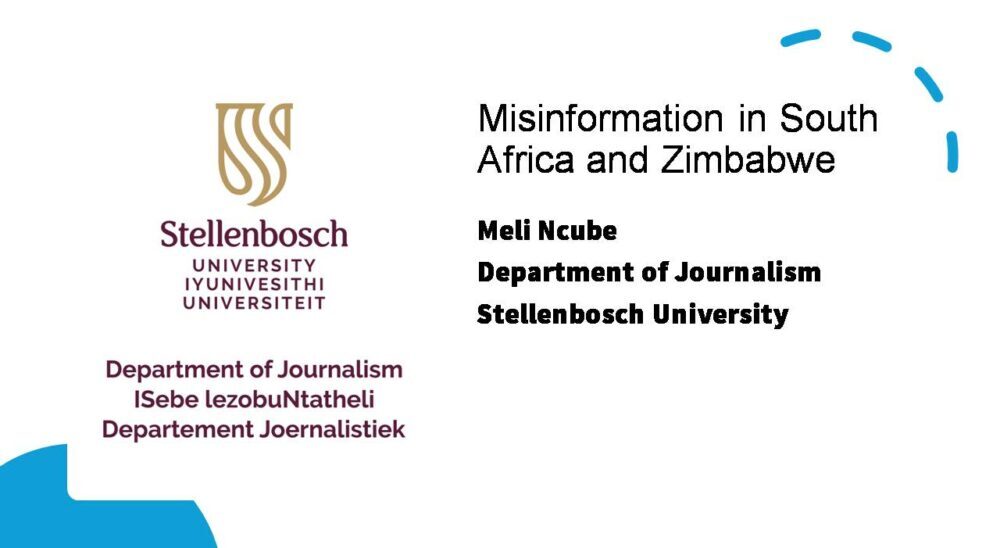
On the 28th of February 2024, I had the pleasure of being invited by Professor of Political Science and Psychology, Briony Swire-Thompson, to talk to her Psychology of Misinformation class. In
her work , Swire-Thompson investigates why people believe in misinformation, why people share misinformation online, and how corrections can be designed to foster belief change. The College
of Science students seized the chance to dig into their burning inquiries regarding misinformation in South Africa and Zimbabwe, and they certainly delivered! Their questions were insightful and probing, reflecting a keen interest in understanding the complexities of misinformation dynamics in these two neighbouring countries in the SADC region.
Questions concerning misinformation in both health and politics took centre stage, showcasing the students’ keen interest in unravelling the intricacies of misinformation dissemination. They eagerly explored parallels between the propagation of misinformation in South Africa, Zimbabwe, against the United States of America (USA), aiming to uncover common threads amidst diverse socio-political landscapes.
The questions by the students:
1. Following the decision of South Africa to challenge Israel in the ICJ on genocide charges, was there an uptick/change in online misinformation content?
2. Do you find that the misinformation spread surrounding certain groups during apartheid persists in the present day? Has it manifested itself in public policies/laws?
3. Do patterns of misinformation in South Africa align in a way that is anti-Western culture due to the history of colonialism?
4. How has misinformation continued to push racism in post-apartheid South Africa?
5. There are reports of increasing misinformation in South Africa – what do you think are the main topics of misinformation that are on the rise?
6. In your opinion, do you think apartheid plays a role in promulgating mis or disinformation about certain groups of people in South African society? If so, how?
7. Are there any laws in place to help combat misinformation?
8. Do you feel the studies on misinformation in South Africa are sufficient in quantity/quality? What is the first thing you would want improved/studied regarding misinformation?
9. What would you say is the biggest threat that misinformation poses to South Africa and/or Zimbabwe?
10. Is there misinformation spread about apartheid?
11. What are the main sources of misinformation in South Africa?
12. Are there any South Africa/Zimbabwe-specific solutions you would propose to combat misinformation?
13. How does political misinformation in South Africa / Zimbabwe compare to political misinformation in the United States?
14. Is misinformation on topics such as public health and vaccines widespread in South Africa?
15. Where do you think misinformation in South Africa originates from? Individual, group, etc?
16. What is the biggest difference between how misinformation spreads in South Africa and the United States?
17. What social media is most prevalent in Zimbabwe? How present is misinformation on these platforms?
18. Where can we look in the US for true information about South Africa?
19. Would you say there is less research on misinformation in Africa compared to the U.S. and if so, why?
Reflecting on the Questions Posed
These questions truly highlight the depth of understanding and the critical thinking skills of the students. They explore complex issues surrounding misinformation, in South Africa and
Zimbabwe, addressing not only historical contexts but also contemporary challenges and implications.
The inquiry into the potential uptick in online misinformation following South Africa’s decision to challenge Israel in the ICJ on genocide charges demonstrates a keen awareness of how geopolitical events can intersect with information dynamics. Similarly, the exploration of persistent and deliberate misinformation campaigns from the apartheid era and its impact on present-day online realities, and policies underscores the long-lasting effects of historical narratives on societal dynamics.
Questions regarding the alignment of misinformation patterns with anti-Western culture and the perpetuation of racism post-apartheid highlight the intersectionality of misinformation with broader social and political issues. Furthermore, the inquiry into the main topics of misinformation on the rise and the role of apartheid in perpetuating misinformation underscore the multifaceted nature of the phenomenon and its deep-rooted connections to historical legacies.
The student’s curiosity about existing laws to combat misinformation and the sufficiency of studies on the topic reflect an awareness of the importance of regulatory frameworks and research efforts in addressing information disorders. Additionally, questions about the biggest threats posed by misinformation and potential solutions specific to South Africa and Zimbabwe demonstrate a forward-thinking approach to mitigating the impact of misinformation on these societies. Comparisons between political misinformation in South Africa, Zimbabwe, and the United States, as well as inquiries into the prevalence of misinformation on public health and vaccine politics, highlight the global nature of misinformation challenges and the need for cross-cultural understanding and collaboration in addressing them.
Overall, these questions not only showcased the students’ intellectual curiosity but also underscored the significance of studying misinformation in the context of South Africa and Zimbabwe, where historical, social, and political factors intersect to shape information dynamics in unique ways.
Meli Ncube, Ph.D., obtained his doctorate in Media Studies from the University of Cape Town (UCT). Presently, he serves as a Postdoctoral Research Fellow at the Department of Journalism, University of Stellenbosch.

